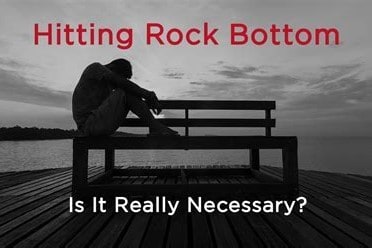When Maggie was a little girl, she recalls that her father had a certain morning routine. Since he was the first one in the household out the door in the morning, he would set up his cereal bowl and his orange juice glass on the kitchen table the night before so they awaited him as he started his day. Maggie is convinced that he sat there peacefully in the morning, pondering and planning his workday. Whether his day was predictable or not, he sipped his daily OJ with an added dose of cod liver oil (yuck!) and prepared for what the day might bring. Some may call Maggie’s dad an optimist, knowing that the next day would be there for him and that he was prepared for it.
It seems that it takes a bit more than a willing breakfast table to prepare for these days. Some may say that we are approaching a “rock bottom” world. First used in the 1700’s, the word rock bottom has been used for many different purposes. The term first originated in agriculture but, in the 19th century, “hitting rock bottom” in the mining industry meant hitting bedrock which meant there was no way to go any lower. Rock Bottom is defined as the lowest possible level or in the worst situation. Rock bottom is generally not a good thing unless it refers to “rock bottom prices” on something like groceries or goods. Rock bottom can be good for some, like in this instance the consumer, and bad, in the other case, for the farmer or manufacturer.
Today, we can see that there are those whose lives have hit rock bottom and there are political states of affairs that have done the same. The question that is currently coming of age is, have we or are we going to hit rock bottom in this country in November 2024? And, if we do, who will benefit?
As countless believe we are already close to rock bottom, many continue to be concerned about a second Civil War because clusters of our population are so strong and forged together. Historians say that they have never seen such a divide in this country with both sides remaining fixed and grasping onto their own beliefs. Both sides are proven to be deep into distrust and wedged into their own corners.
If things do come to battle, we are afraid that it will not be an intellectual one. Our own prejudice tells us that Trump’s far-right is not wed to intellectual conversation but would rather raise a fist and strike with force. We saw this on Jan 6th and there is no indication that this will change come November 7th.
The question remains, should we prepare for rock bottom and what does that mean? Do we stock up on medications, groceries, build fallout shelters, and keep our children home from school? Do we worry, pray, meditate, or just wish our way out of this? So many questions are surfacing leading up to the 2024 election.
How do we prepare for such an event? Does this go beyond preparing our breakfast tables or building a fallout shelter? Let us ask the “preppers.” Preppers have stated that about 15 million Americans or 10% of households are actively prepping for a catastrophic disaster or large-scale emergency. And they believe that one is likely to occur in the future. Preppers believe that our country no longer has the infrastructure to deal with mass emergencies in a meaningful way. Thus, preppers stockpile food, ammunition, and other provisions. Some have built shelters that can sustain life for up to a year with food, fuel, water filtration systems, and entertainment to pass the time. Their three principles are planning, resources, and skills.
Preppers represent Republicans, Democrats, Independents, and non-party affiliated persons. Building bunkers, creating a safe place, and assuring peace of mind, the “doomer optimist” is preparing for a life beyond government. Like everyone else, they want to subsist and are optimistic about how things will be for them if they prepare.
It is overall difficult to think of such a world and that our country could become war torn. Preparations such as having a plan, stocking “bug out bags,” where to go, where to meet your family are overwhelming thoughts to say the least. “Bug in” plans include adequate water, ham radios, canned goods, seeds to grow, etc. in order to sustain life at home. For us, the thought of this kind of turmoil is like the modern-day Cuban Missile Crisis, 9/11, COVID, and Jan 6 all melded together and like nothing we have recently seen or lived through in our lifetime.
As the sun’s poles begin to magnetically flip this spring as they do every 11 years, we are hopeful that the earth’s emotional poles will change as well, resulting in increased optimism. Optimism, although best juxtapositioned with patience, is what keeps the heart alive. It has been said that pessimists run with the rats and are pure spectators where optimists have the potential of owning the world. Kahlil Gibran once said that “The optimist sees the rose and not its thorns; the pessimist stares at the thorns, oblivious to the rose.”
We figure whether you are an optimist, pessimist, survivalist, a prepper or a “let nature take its course” kind of person, you may want to be, in some way, prepared. We all seek peace of mind, but in the upcoming months we may have to do a little more work to maintain it. Hitting rock bottom can be a challenge but, optimistically, the only way to go is up!
Semper Paratus – Always Ready!

The 1950’s
This blog is dedicated to Alexei Navalny who died while in a Russian prison and to all peacemakers working to keep our liberties alive. Once again, it is time to continue to unite against all forms of hate and fascism. It is weak Putin-like dictators who imprison and exterminate their adversaries. As the Putin-loving Republicans continue to romance tyrants like Putin, let their feebleness be exposed to the world. For when peacekeepers die, we must not just extend an olive branch but cultivate stronger roots of freedom.


